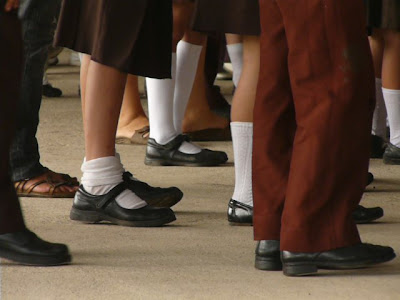 |
| Two SJBS drama clubbers searching for donors |
Did you read my blog at any point last year? Did it make you
laugh or cry? O.K. that might question may be a bit presumptuous, but even if my
posts didn’t elicit such a strong response from within, I think we can all
agree that, at the least, you got a clear idea of what my experience was like.
In doing so you must have seen that volunteering as a
teacher at San Jeronimo Bilingual School was the most important, challenging,
and rewarding thing that I have done in my life. Whether you saw a video of the
middle schoolers that I taught the integrated art class to singing renditions
“Home” or “No Woman No Cry” or you were amazed that my 1st-6th grade drama
club was able to pull off a complete musical production of the Jungle
Book, it is clear that despite the obstacles that I faced (lack of hot
water, intestinal parasites, malaria
etc…) it was a labor of love that was incredibly important to me.
I’m not going to beat around the bush. I am writing this
post with a specific need. BECA needs
funds. The organization just opened another school in Vida Nueva, a community
close to Cofradia. It is incredibly exciting to be expanding our model to
another community in Honduras that has a large population of at-risk kids who
are eager to learn.
This expansion, however, has put pressure on BECA’s
extremely limited budget (roughly $100,000 a year). With this budget, funded almost solely by
individual donations, BECA houses and feeds 16 volunteer teachers/yr, (I was one of them, remember?), a feat that
makes these students bilingual education affordable and possible. This budget
also allows for 25% of our students to get scholarships to attend our low-cost
school (by far the lowest-cost bilingual education offered in Honduras),
provides two scholarships/yr to graduating students who are of financial need
who want to attend bilingual high school, and provides a minimal salary to our
one Program Head (a salary that should be much greater than it is). The program
head is the only paid employee of BECA.
I can personally attest that your donation will be put into
the most worthy of causes and used in an incredibly judicious fashion (BECA
functions on very little overhead). Here are a few ideas of how far your $
could go in Honduras:
$18
You could feed a volunteer teacher for a week (Amazing, right? I
can’t remember the last time I paid $18 for a dinner out!)
$120 You could fund a K-9 teacher classroom
budget for one year.
$350 You could fund “Libros y Familias”, a
family based literacy program that ends
with the donation of a book to each family (sometimes the only book a family
may own.
$650 you could pay for the internet service
at SJBS for one year.
$2,100 you could sponsor a high school student to
attend a bilingual school after graduation from SJBS.
$5
You could help us work toward any of the aforementioned objectives.
The point of all of this is that your donations truly go so
far. Unlike donations to a large aid agency, there are minimal “administrative
costs” to run this organization and you know your money will be put to good
use. To donate go to becaschools.org and
click on the icon “directly donate to the school.”
Please help this organization to continue to do their oh so
important work. The work that it does in Cofradia has transformed the lives of
countless families, has unified a community provides incredible opportunities
to at-risk youth (who are also incredible human beings, who also happen to love music and drama and art and sports and all things kids).
Seriously, there is no donation too small.
Thank you for your help and thank you for following my blog.
It was a truly transformative experience for me, one that I hope to enable for
all of the volunteer teachers to come.
Signing off until I once again have a blog-worthy life
circumstance…
















































